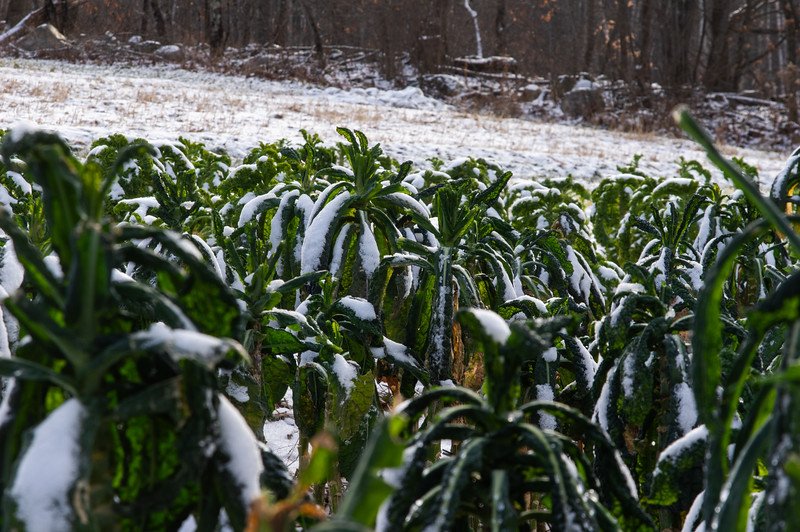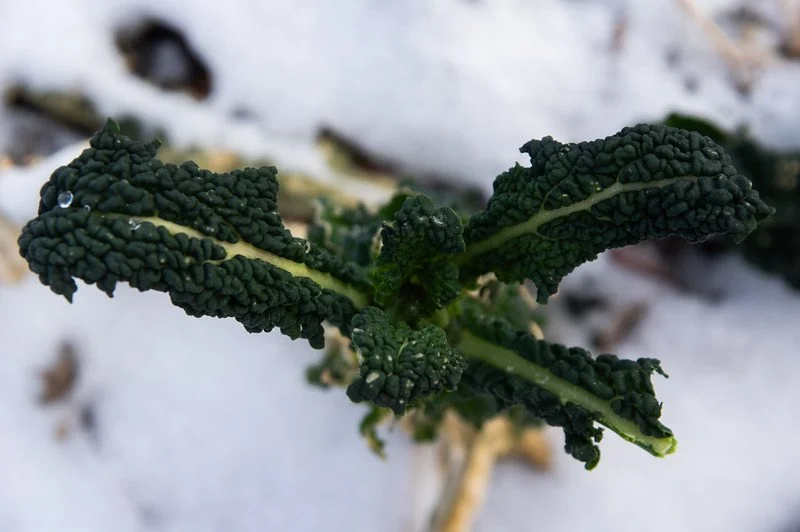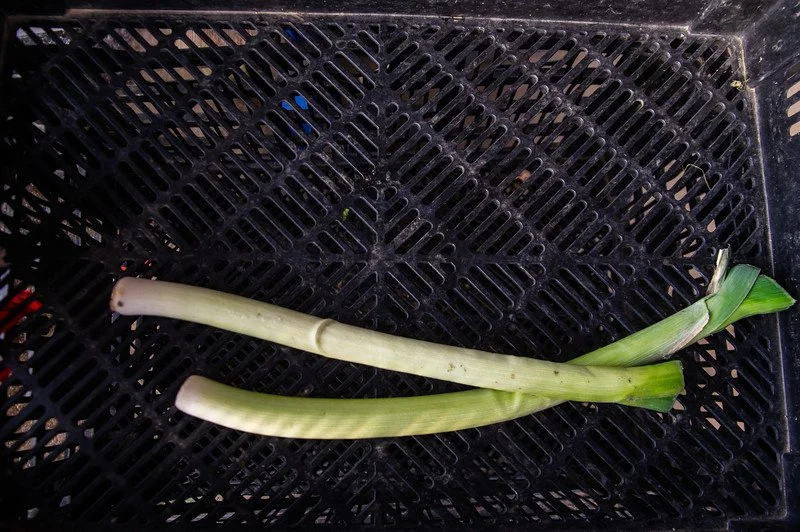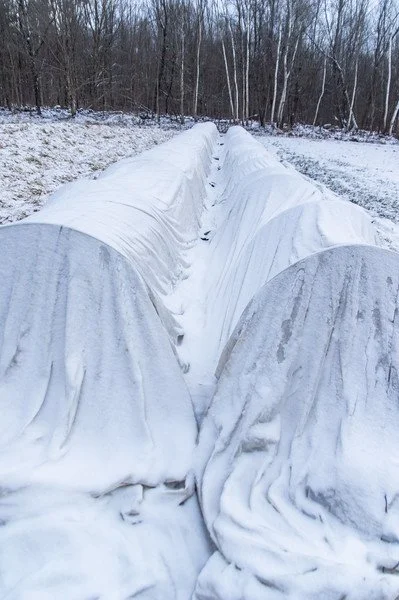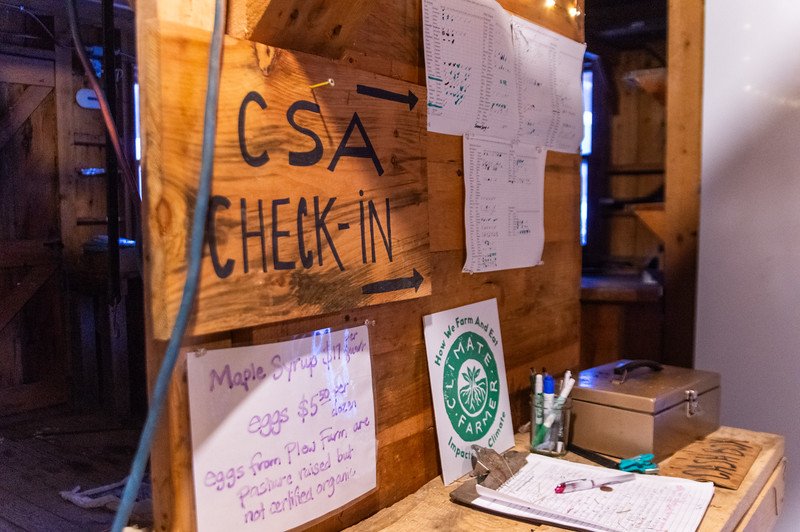8th Week of the Fall CSA season: Week of December 13th
barn through the dead flower garden, photo by Adam Ford
CSA Balance Due
It would be helpful to have everything paid before the end of this CSA season, thanks!
If you haven’t already paid, your balance is due this week. You can pay online through your account (with a card or e-check ACH payment), mail a check to Evening Song Farm 48 Nice Road, Cuttingsville VT 05738, leave a check or cash in the CSA cash box at the barn, send money with Venmo @eveningsongcsa, or use EBT. It’s very cool to pay in smaller chunks, just let us know what your payment plan is. Unless you email us with your payment plan, or set up a payment plan on the Farmigo dashboard, please pay for the entire season now. It saves us valuable farm work time to have payments at the beginning of the season or on a planned payment schedule. Thank you!
If you are able to pay with a check, e-check, cash, Venmo, or EBT, it saves us a considerable amount of money compared to card transactions. We know that it’s necessary for some folks to use a card, so don’t feel bad if you have to use that option. Thanks!
can you believe we are still harvesting the lacinato kale from outside? lots of row cover does amazing things, photo by Adam Ford
after we are done bunching the larger leaves, we cut these tender tops off to bag up… lacinato just keeps getting nicer with the cold, photo by Adam Ford
This Week’s Availability
This week we will have yellow potatoes, red potatoes, baby kale, claytonia*, Tokyo Bekana**, baby lettuce, pea shoots, green curly kale bunches, lacinato kale, garlic, shallots, leeks, carrots, baby carrots, Painted Mountain grain corn, brussels sprouts, watermelon radish, daikon radish, spinach, mini red lettuce heads, mini green lettuce heads, green cabbage, rutabaga, yellow onions, and Gilfeather turnip.
*This week we started having to remove the outer leaves of each brussels sprout because the outer leaves have started to yellow in storage. The entire rest of the brussels sprout is fine. Because this is a very slow, time consuming step to take for the 100+ pints of brussels sprouts we clean up each week, but it’s not a big deal when I bring a pint or two into my house to clean up for dinner, we are offering brussels sprouts two different ways this week: You can order the normal pint’s worth, yellow leaves removed and ready to go, or you can order a quart’s worth (twice as much) with the outer yellow leaves still on. This means you will get twice as many brussels sprouts for your item ordered, but you will have to take a few minutes to remove the outer yellow leaves on them.
the quart on the left is what the brussels with outer yellow leaves look like, compared to the pint on the right that has them removed for you, photo by Ryan
Ordering closes at noon on Tuesdays for Wednesday bags, and at midnight on Wednesdays for Friday bags.
You do not need to fill out the form if you plan to come to the barn on Wednesdays or Thursdays to pick out your items yourself.
looks like those are heading to the farmer leek bin, also known as heading to my kitchen, photo by Adam Ford
this sweet sketch that a CSA member drew of the barn is tacked in our packing area, photo by Adam Ford
Farm News
As far as our vegetable farm goes, it’s been very nice to have some sunny days this past week, and the relatively mild December conditions. Even when it feels cold outside, our high tunnels and wash shed warm up nicely with the sun out, which makes such a difference spending a long time working with vegetables in greenhouses in the winter.
One big project we will tackle this week, as referenced above, is removing from the stalks and sorting the brussels sprouts that have started developing outer yellow leaves from the ones that have not. When we bulk harvested them, it was before a very cold night, so worked quickly to harvest the entire zone of brussels sprouts, sawing each stalk down and storing them in large bins in the root cellar on the stalks. Over the past couple weeks, some of the sprouts on the stalks have started to yellow the very outer leaves on the sprouts. To clean up hundreds of pints of brussels sprouts is a lot of work, but to clean up a pint or two is really no big deal with a paring knife! So for this week, we will include a special offer of U-Trim brussels sprouts, with one quart being an item instead of 1 pint of regular sprouts. This makes it easy for us to distribute them, and you’ll get a nice haul of brussels that will look beautiful after just a couple minutes of relaxing, meditative knifework. Look for them at your nearest Evening Song CSA pickup! And for anyone who might not want to spend their time removing yellow leaves from brussels sprouts (no judgment! some of us are real busy!), we will also have regular pints of beautiful cleaned up sprouts available too.
This time of year is surprisingly busy with the “invisible” work of running a farm business. We are working on figuring out any changes to production and marketing for the upcoming season, which in turn affects our crop and seed planning. We try to get our seed orders completed before the end of the year, because some popular and specific varieties of crops can be sold out quite quickly. And seed ordering is not small feat around here. It’s a several day project, sometimes a few weeks, with a detailed spreadsheet as we gather information from this past growing season. Being a certified organic farm, there’s also a little additional paperwork to the seed ordering process. But it can happen around a cozy woodfire, and that’s a pretty sweet office setup as long as the kids are at school. We also use December to assess the previous year’s budget and start to create next year’s budget. And this year we are both doing a lot more digging for grant money that may be available out there for some of the projects we are experimenting with on the farm. The Inflation Reduction Act did provide federal money for various agricultural issues. The biggest way we are exploring our climate impact here is through low- and no-till method development, and with all the various state and federal grants available at this time, we are trying to see if there is a way to support some of the transitional work we are doing here. So far we haven’t found anything that would be a great fit our particular work, but that’s just part of the assignment…. keep looking.
Have a great week,
-ESF Team: Ryan, Kara, Cindy, Galen, Katie, K2, Taylor, Vanessa, and Tabita (and Sky and Soraya)
This is a standard favorite meal around here. If you want to add some extra deliciousness to this soup, we cut in a bunch or bag’s worth of greens to this recipe as thin ribbons before it gets broiled…. kale, spinach, chard, any green will do.
This is chickweed trying to choke out the spinach… this is a bummer, and a lot of work to remove. One of the farms I worked at early on in my experience farming would not bother weeding this out. They would cut the spinach and chickweed together as a salad mix because chickweed is edible and very nutritious. And if I was going for a texturally variable salad, I would also enjoy this. And if I was cooking up these spinach greens in something like quiche or pureed in soup, I would also never know that there is chickweed in the mix. But we aim to get several harvests of the spinach, and we know that some folks prefer spinach on its own, so either we will find the time to rescue this spinach or lose this area to the chickweed, photo by Adam Ford
another bed of onions at the top of the field above the tunnels, photo by Adam Ford
newly arrive compost pile that Ryan mixed with ash bark mulch, photo by Adam Ford
snow shedding off the tunnel, photo by Adam Ford
green curly kale, photo by Adam Ford
red lettuce head, photo by Adam Ford
This is an overwintered onion experiment. Pleasant Valley Farm over in Argyle, NY has been overwintering fall planted onions for years, that they can then harvest in the spring when farmers are usually just planting onion seedlings. We have always wanted to give it a shot, but have dragged our feet because our winters are a bit colder and harsher than they are, even though they are in a pretty similar growing zone. This year we gave it a whirl, and after planting them, we mulched them heavily, and then Ryan dragged all this heavy duty row cover over them, holding them down with sandbags over the winter, and we are crossing our fingers, photo by Adam Ford
ground cover for an area harvested too late in the season to cover crop, photo by Adam Ford
deer clear off any remaining plant debris when we are done harvesting, photo by Adam Ford
CSA check in at the barn, photo by Adam Ford
entrance to the barn, photo by Adam Ford


